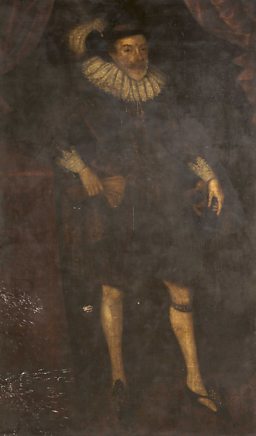Small town proves a big attraction for Shakespeare's players
It may be a surprise that Congleton, a small market town on the River Dane near the foothills of the Pennines, was a regular stop on the tour route North for the King’s Men for two decades.
-
![]()
Much ado near me
Hear more Shakespeare stories on BBC Radio Stoke
-
![]()
Shakespeare Festival 2016
The BBC celebrates the genius of the bard

William Stanley 6th Earl of Derby. With thanks to Museum of Wigan Life, Wigan Council
Come, bustle, bustle; caparison my horse. Call up Lord Stanley, bid him bring his power: I will lead forth my soldiers to the plain, And thus my battle shall be orderedRichard III, Part 3
Between 1614 and 1633, their preference seems to have been a Northern tour later in the year or early spring and although Shakespeare would never have joined them on the road, there is no doubt that some of his plays would have been in the provincial repertory.
The history plays especially would have had appeal, given they featured members of the Northern nobility such as Thomas Stanley, Earl of Derby (Richard III, revived at court in 1633) and the Percy Earls of Northumberland (Henry IV, Part 1, revived at court, 1612-13 and1625).
On two occasions the King’s Men were paid jointly with the Earl of Derby’s Men, one of the most active playing troupes circulating in the north.
Certainly as actors constantly circulating locally, they were available to expand the performance capacity of other professional companies on tour so the King’s Men were not alone in joining forces with Derby’s Men. Between 1st November 1620 and 30th January 1621, and then again on 14th December 1623, they are named together in the accounts. The performance in 1623 is known to have taken place at the Swan Inn and was likely indoors, especially given the date late in the autumn.
The Swan was an important inn with a half-timbered facade set at an imposing height on West Street, a main road winding through Congleton to the left off High Street. During the period of Jacobean and Caroline performance, the inn was owned by Randall Rode, mayor of Congleton in 1606–8, 1621–2, 1633-4 and 1635–6 (Head, Congleton Past and Present 50). By the 18th century the Swan, renamed the Lion and Swan, became Congleton's principal coaching inn.
The present two-storey inn is heavily restored and was mostly rebuilt and extended in the 19th century in brick to include a stable block and coach house. New gables were added on either side of the central front. A section of 16th century wattle and daub fabric and load-bearing timbers remain on the ground floor in the central core. No inn-yard survives though there is a deep car park to the right of the inn.
The King’s Men first appeared between 25th December 1614 and 24th March in 1615. They returned twice in the autumn of 1620, early in 1623 and then again in November the same year. Four more trips North through Congleton were made in 1627 (December), sometime in 1630-1, and spring 1633. The reward was typically 10 shillings – the town was consistent in its level of payment but not lavish.
William Stanley, the 6th Earl of Derby, was an enthusiastic patron. When he inherited the earldom from his brother Ferdinando in 1594, he started up his own troupe.
But the core of the Derby’s star company had migrated to join Shakespeare and Richard Burbage among others to form the new Lord Chamberlain’s Men by early summer 1594.
Stanley may even have written some plays for his troupe. In 1599, a letter written by the Jesuit spy, George Fennor, reported that Earl William was ‘busye in penning comedyes for the common players.’

Shakespeare on Tour
From the moment they were written through to the present day, Shakespeare’s plays have continued to enthral and inspire audiences. They’ve been performed in venues big and small – including inns, private houses and emerging provincial theatres.

BBC English Regions is building a digital picture which tracks some of the many iconic moments across the country as we follow the ‘explosion’ in the performance of The Bard’s plays, from his own lifetime to recent times.
Drawing on fascinating new research from Records of Early English Drama (REED), plus the British Library's extensive collection of playbills, as well as expertise from De Montfort University and the Arts and Humanities Research Council, Shakespeare on Tour is a unique timeline of iconic moments of those performances, starting with his own troupe of actors, to highlights from more recent times. Listen out for stories on Shakespeare’s legacy on your BBC Local Radio station from Monday 21 March, 2016.
You never know - you might find evidence of Shakespeare’s footsteps close to home…
Craig Henderson, BBC English Regions
-
![]()
Shakespeare Lives
The nation’s greatest performing arts institutions mark 400 years since the Bard's death
Related Links
Shakespeare on Tour: Around Stoke
-
![]()
Celebrated young actor stars as Hamlet
Child prodigy actor who took theatres by storm in 1804 stars as Hamlet in Stafford
-
![]()
Travelling players put on Macbeth in an unconventional setting
Travelling theatre company puts on Macbeth in the unconventional setting of a sheep fair
Shakespeare on Tour: Around the country
-
![]()
Lancaster Theatre sparkles with Shakespearean talent
The Grand Theatre in Lancaster, which was once managed by Stephen Kemble
-
![]()
Reading’s Puritans turn away Shakespeare
Shakespeare's men paid not to play in Reading
-
![]()
Belvoir Castle
Belvoir Castle, home of the Duke of Rutland
-
![]()
Did Shakespeare visit Bristol in 1597?
Civic accounts show a high amount of performances in Bath









